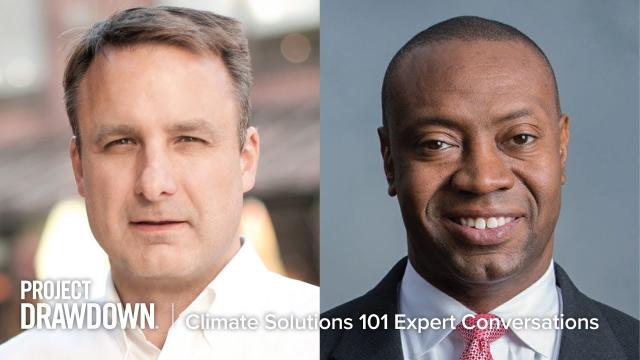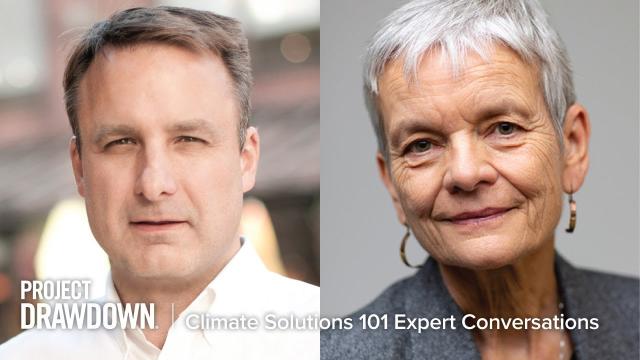Unit 1: Setting the Stage
Building the future we want requires an understanding of our collective past. Explore the last 50 years of stunning change—from food demand, water, population, ocean health, and beyond—to see our current climate inflection point in context. This introductory video is a fascinating must-watch before continuing your Climate Solutions 101 journey.
Quick Links
Expert Conversations
Georgia Athletic Association Distinguished Professor of Atmospheric Sciences and Geography, University of Georgia
Shepherd is a leading international expert in weather and climate and the Georgia Athletic Association Distinguished Professor of Atmospheric Sciences and Geography at the University of Georgia. He is the host of The Weather Channel’s award-winning Sunday talk show and podcast Weather Geeks, and a contributor to Forbes Magazine. Shepherd is a former NASA scientist and winner of numerous awards, including the prestigious AMS Helmut Landsberg Award for pioneering significant work in urban climate. Shepherd is frequently sought as an expert on weather, climate, and remote sensing—he routinely appears on leading broadcast programs around the world. Follow him on Twitter and visit his website.
Hear more about equitable climate action in Unit 1, which covers 50 years of stunning change—from food demand, water, population, ocean health, and beyond.
Join Shepherd, former NASA scientist and leading weather and climate expert, for a journey into equitable climate action across all levels of agency. Explore climate solutions in Georgia, urban planning, and the importance of storytelling for the road ahead.
23:53Mary Laird Professor and Dean of the College of the Environment, University of Washington
Graumlich is the Mary Laird Wood Professor and inaugural dean of the College of the Environment at the University of Washington. As dean, she leads a College with unparalleled depth and breadth in environmental systems: from the forests to the seas, and from the center of the earth to the edges of the solar system. As a scholar, Graumlich pioneered the use of tree-ring data to understand long-term trends in climate. She has held several faculty positions, fellowships, and directorships, and was elected to both the Board of Directors and presidency of the American Geophysical Union (AGU). Follow Graumlich on Twitter and visit her online.
Hear more about privilege, race, and economics in Unit 1, which explores the last 50 years of stunning change as context for our current climate inflection point.
Join Graumlich—Mary Laird Wood Professor and inaugural dean of the College of the Environment at the University of Washington—for an exploration of privilege, race, class, and the importance of listening in building successful climate solutions.
32:42
Georgia Athletic Association Distinguished Professor of Atmospheric Sciences and Geography, University of Georgia
Shepherd is a leading international expert in weather and climate and the Georgia Athletic Association Distinguished Professor of Atmospheric Sciences and Geography at the University of Georgia. He is the host of The Weather Channel’s award-winning Sunday talk show and podcast Weather Geeks, and a contributor to Forbes Magazine. Shepherd is a former NASA scientist and winner of numerous awards, including the prestigious AMS Helmut Landsberg Award for pioneering significant work in urban climate. Shepherd is frequently sought as an expert on weather, climate, and remote sensing—he routinely appears on leading broadcast programs around the world. Follow him on Twitter and visit his website.
Hear more about equitable climate action in Unit 1, which covers 50 years of stunning change—from food demand, water, population, ocean health, and beyond.
Join Shepherd, former NASA scientist and leading weather and climate expert, for a journey into equitable climate action across all levels of agency. Explore climate solutions in Georgia, urban planning, and the importance of storytelling for the road ahead.

Mary Laird Professor and Dean of the College of the Environment, University of Washington
Graumlich is the Mary Laird Wood Professor and inaugural dean of the College of the Environment at the University of Washington. As dean, she leads a College with unparalleled depth and breadth in environmental systems: from the forests to the seas, and from the center of the earth to the edges of the solar system. As a scholar, Graumlich pioneered the use of tree-ring data to understand long-term trends in climate. She has held several faculty positions, fellowships, and directorships, and was elected to both the Board of Directors and presidency of the American Geophysical Union (AGU). Follow Graumlich on Twitter and visit her online.
Hear more about privilege, race, and economics in Unit 1, which explores the last 50 years of stunning change as context for our current climate inflection point.
Join Graumlich—Mary Laird Wood Professor and inaugural dean of the College of the Environment at the University of Washington—for an exploration of privilege, race, class, and the importance of listening in building successful climate solutions.






